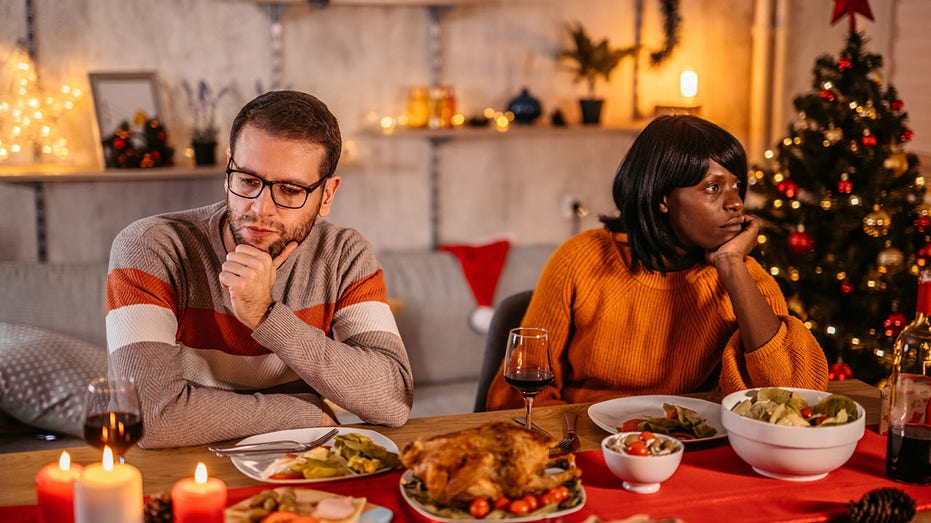Keeping politics off the table: Expert shares tips to keep your holiday table from turning into a warzone
Pamela Eyring, president and owner of the Protocol School of Washington, offered Fox News Digital key tips to diffusing and preventing politically-driven arguments around the holidays.

Visions of cozy gatherings, shared meals, fun, family and laughter that might fill our minds when we think of surrounding ourselves with loved ones for holiday get-togethers can quickly give way to reality when the time arrives – navigating disagreements, clashing personalities, and, all too often, political debates that turn the dinner table into a warzone.
And, this year, the "political minefield" might feel more treacherous than ever. Some experts have even controversially suggested cutting ties with family members who voted differently this election year, a "cultist" suggestion to some.
Others are more determined to mend the wounds of division and make the holiday experience about bringing people together.
But take one wrong step in this minefield, and heartfelt musings about faith, family or the other parts of life that matter most to most people could spiral into a horde of politically-charged insults shouted between passionate Trump and Harris-voting family members who fail time and again to set politics aside and focus on a shared experience that brings them together, albeit briefly.
If you're hosting, what can you do to lower the temperature, diffuse tension, and keep the focus on connection instead of division? Etiquette expert Pamela Eyring suggests it might be smart to set the tone ahead of time.
DANA PERINO'S NO. 1 RULE WHEN ATTENDING OFFICE HOLIDAY PARTIES
"If you're concerned about this as the host, I would recommend you, as you invite them, say, 'We're going to celebrate the holiday, or we're going to steer away from politics, It's going to happen whether you like it or not or she likes it or not,' and we're going to have a good time and try to set the stage before they arrive," she told Fox News Digital.
"That's what our focus is," she continued. "Or avoid and steer clear from politics or any other sensitive topics. Let's just have a good time and say it in a positive tone and let them know that I'm going to tell the whole family."
Eyring is the president and owner of the Protocol School of Washington, where communicating effectively and respectfully diffusing such tensions is essential to training.
But what happens when tensions still arise? Eyring suggests staying calm and redirecting the conversation with gentle authority.
"I always call it change the topic, change the person," she said.
15 HOLIDAY GIFTS FOR DEMENTIA PATIENTS AND CAREGIVERS: ‘COGNITIVELY APPROPRIATE’
The goal, she added, is to avoid letting conversations drift into areas like politics, illness, or unresolved family drama by directing your guests' attention elsewhere. When a discussion begins to heat up, Eyring suggests gently redirecting the conversation – affirming that the discussion is being tabled and pivoting to another family member who recently had something interesting happen in their life.
"So you're changing the topic, you're changing the person," she continued. "It's a nice way to say, 'hush up. I told you, we're not talking about that. We're not causing a rift.' You – the host – is in control and so, by doing that, it helps and people get it. They'll be quiet because of how you handled it."
Inclusive activities – such as setting the table, watching a football game, bringing out a board game or another distraction that gives people a common goal – are another good way to bring out commonalities and lessen the depth of their differences, she suggested.
Even seating arrangements can make a difference, she noted. If you're hosting a large group, consider splitting up guests with opposing views so they aren't seated close to each other, allowing smaller, more positive conversations to bubble up within these groups naturally.
12 EASY, TECHY WAYS TO MAKE THE HOLIDAY SMOOTHER
But differences and hard discussions aren't always avoidable. Sometimes, guests can be persistent, pushing conversations back into uncomfortable territory. When that happens, Eyring encourages hosts to steer the discussion with patience and empathy.
"Maybe you're hosting, and you didn't realize how vocal your grandfather is about the election. It happens, so you try to steer the conversation out. But perhaps it is a good time to have common values, and I like to focus on humanity and also seek to understand."
Ultimately, creating a peaceful holiday gathering boils down to preparation, thoughtful redirection and finding ways to bring people together, no matter how far apart.



